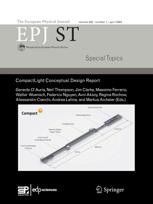New call-to-action empathises scientists’ role in combating climate change
This first paper published in the special issue on Energy Saving in Physics Research and Applications in EPJ Special Topics looks at the roles of science on universe and matter and digital transformation in the ongoing battle to reduce global temperature.
New York | Heidelberg, 3 February 2025
 “Climate change is real.” That stark and undeniable statement spearheads a new call to action in a paper published in a special issue of EPJ Special Topics (EPJ ST), focusing on energy saving in physics research and applications. This call to action doesn’t outline a general package of measures and daily life recommendations to aid in efforts to limit rising global temperatures, rather it specifically focuses on the use of resources by scientists conducting research, particularly in the field of universe and matter. The paper advocates the use of digitisation methods to potentially offset resource consumption without sacrificing knowledge gains.
“Climate change is real.” That stark and undeniable statement spearheads a new call to action in a paper published in a special issue of EPJ Special Topics (EPJ ST), focusing on energy saving in physics research and applications. This call to action doesn’t outline a general package of measures and daily life recommendations to aid in efforts to limit rising global temperatures, rather it specifically focuses on the use of resources by scientists conducting research, particularly in the field of universe and matter. The paper advocates the use of digitisation methods to potentially offset resource consumption without sacrificing knowledge gains.
“Until now, the research community working with large-scale equipment in the fields of universe and matter has focused on developing measurement methods, collecting data, and analysing it as thoroughly as possible,” research co-author and RWTH Aachen University professor of high-energy physics Martin Erdmann says. “With the ongoing discussion about climate change, considerations regarding resource consumption are increasingly coming to the forefront. Great innovation potential to advance our research arises from digital transformation.”
The call to action arose from a self-managed organisation for around 20,000 scientists in Germany formed by Erdmann and colleagues. During a workshop held in May 2023, about 40 participants specified the possible contribution of researchers to sustainability measures.
“We describe a necessary cultural change in our research fields. Until now, the principle has been to gain the maximum amount of knowledge from the experiments as quickly as possible, with considerable resources being spent on even the smallest improvement in the results,” Erdmann explains. “From a sustainability point of view, this necessary cultural change involves sensibly balancing the potential gain in knowledge with the resources that must be invested.
“At the same time, we believe that by considering resource consumption, planning measures for gaining insights can result in efficiency gains that lead to maximum knowledge gain with fewer resources and may even accelerate research.”
This is the first article published in the EPJ ST Special Issue on Energy Saving in Physics Research and Applications, for which there is an Open Call for Papers.
Further contributions to the special issue are published consecutively and can be found here.
Reference: Bruers, B., Cruces, M., Demleitner, M. et al. Resource-aware research on Universe and Matter: call-to-action in digital transformation. Eur. Phys. J. Spec. Top. (2024). https://doi.org/10.1140/epjs/s11734-024-01436-4
Further Information
For more information visit: www.epj.org
Services for Journalists
The full-text of the article is available here.
Contact
Sabine Lehr | Springer | Physics Editorial Department
tel +49-6221-487-8336 | sabine.lehr@springer.com
